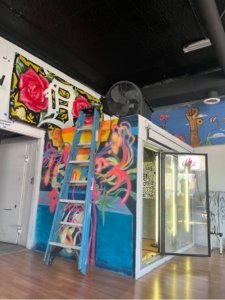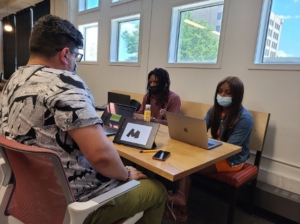For our culminating and last challenge of the 2021-2022 program year, eight teams of Fellows selected nonprofits to work with that they were excited to support. Leveraging skills practiced and developed over the course of the fellowship, they co-designed these project collaborations with their partner organization. Fellows Thomas Cairgle, Albi Taipi, Callie Brantley, Akash Raje, and Courtney Harper partnered with nonprofit Motor City Street Dance Academy (MCSDA) with Benito “Mav-One” Vasquez and Mateo Rodriguez. Learn more about the collaboration below.

A look into Motor City Street Dance Academy’s dance space, including their beat-making room.
Detroit is a city where creatives, artists, and innovators are using their passions to make lasting change. Motor City Street Dance Academy (MCSDA) is one example of the intersection of art, community work, and transformational pedagogy. Per their mission statement, “MCSDA works to enhance the lives of Detroiters through hip-hop, physical activity, and healthy living. MCSDA is grounded in uplifting disenfranchised communities in Detroit, much like the pioneers of hip-hop did decades ago. MSCDA works actively to mentor Detroit youth and provide a safe space for them to express themselves in Southwest Detroit.” Our team, made up of Callie Brantley, Thomas Cairgle, Courtney Harper, Akash Raje, and Albi Taipi, chose MCSDA as our project partner so we could explore the intersection of hip-hop, education, and youth services in Southwest Detroit. After discussions with MCSDA’s Executive Director and founder, Benito “MavOne” Vasquez, we decided on the design question, How might we build a Youth Intervention Program and Scholarship for staff-wide implementation at MCSDA?
After planning the deliverables and basic outcomes of our project, we began our community interviews. We spoke to various stakeholders, from MCSDA instructors, to students, to teachers and social-emotional learning professionals in Detroit, and we aimed to understand the unique challenges and needs of Detroit youth. Motor City Street Dance Academy uses DJing, beat-making, hip-hop dance, and art to provide classes to students in Southwest Detroit, so we focused on hearing from the community. We learned that there is a large demand for their classes and methodology, and that social-emotional needs are essential for their base of students. Wendy Cortes, Student Support Specialist & DEI coordinator at Escuela Avancemos, told us, “You can’t get a student to focus on excelling on academics or enrichment until social-emotional needs are met.” These community stakeholder meetings allowed us to understand what a Youth Intervention Program would need to include to benefit students at MCSDA.

Deliverable meeting with MavOne – featuring his iPad graffiti art!
As we continued to define the issue, ideate on fixes, and prototype our work, we came up with three deliverables: a Youth Intervention Project Plan, a Youth Intervention Staff Training, and a Youth Intervention External Stakeholder Presentation. The project plan included all components of our recommendation, a Youth Intervention Program for youth having behavioral difficulties. The staff training presentation utilized a social-emotional learning course that our group found from an education organization. This allows staff members to receive module-based training in social-emotional learning and consider how they can implement it for their students. Finally, the external stakeholder presentation explains the Youth Intervention Program to school administrators, teachers, parents, and families. With these deliverables, we recommend that MCSDA implement the Youth Intervention Program as an extension of their class offerings. Our team was excited to spend this spring and summer with Motor City Street Dance Academy, and we found their work meaningful and essential to the Southwest Detroit community.
***

